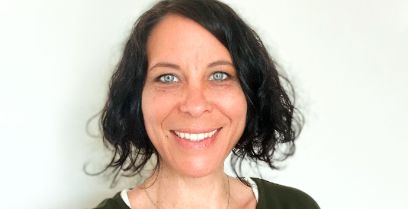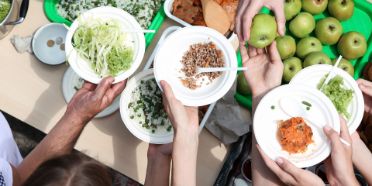Umami – nutrition skills for the next generation
Umami is an educational programme that teaches primary school students in Switzerland about healthy and sustainable nutrition. The aim is to strengthen children’s food skills so that they can look after their own health and the health of the planet.
Factsheet
-
Funding organisation
Gesundheitsförderung Wallis
Kanton Wallis (Agenda 2030 und Dienststelle für Unterrichtswesen)
Gesundheitsförderung Schweiz
Fondation LVPP
Loterie Romande
Federal Office for the Environment (FOEN)
BFH strategic thematic area of Sustainable Development - Duration (planned) 15.11.2023 - 31.12.2025
-
Head of project
Charlotte Bourcet
Véronique Michelet (Stiftung Senso5)
Dr. Joyce Haddad (Lead Evaluation)
Sarah Morier (Lead Didaktik) -
Project staff
Charlotte Bourcet
Ariane Reist
Eugenia Harms
Franziska Scheidegger-Balmer
Dr. Joyce Haddad -
Partner
Stiftung Senso5
Pädagogische Hochschule Wallis
Fachhochschule Nordwestschweiz
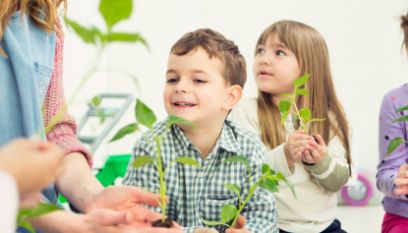
Why umami?
Eating habits have an impact on health, society and the environment. In Switzerland, health costs due to an unbalanced diet amount to CHF 8 billion per year, and global food consumption is responsible for an average of one third of consumption-related environmental pollution. A change in the Swiss population’s eating habits is essential if we are to achieve the Sustainable Development Goals (SDGs) by 2030 and the goal of “net zero emissions” by 2050.
Schools play a key role
Eating habits are formed in childhood and are usually carried into adulthood. Parents, who are at the forefront of teaching healthy and sustainable eating habits, often don’t have the necessary nutritional education themselves. In this context, public schools play a key role by offering children equal access to nutrition education. Unfortunately, the timetable at Swiss primary schools offers hardly any space for education in the areas of nutrition and sustainability.
Umami in concrete terms
Umami offers ready-made teaching modules on eight topics related to the objectives of the Romandy Curriculum and Lehrplan 21 for teachers of cycles 1 and 2 (for ages 4 to 12). To supplement the classroom modules, activities on the relevant topics are offered to families. Collaboration between schools and families helps to consolidate long-term knowledge acquisition.
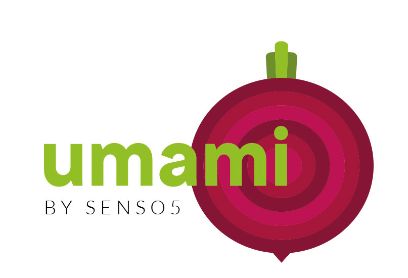
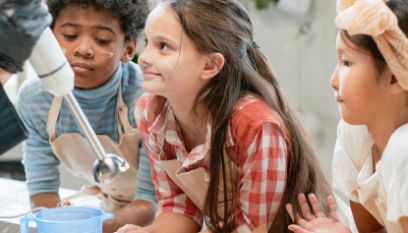
Network research project
The development of the umami programme is led by an inter- and transdisciplinary team. Researchers from BFH-HAFL and BFH School of Health Professions, who specialise in sustainable nutrition, food science, nutritional sociology and sensory analysis, are working closely with teachers and teaching specialists from German-speaking and French-speaking Switzerland to develop the programme.
An inter- and transdisciplinary team:
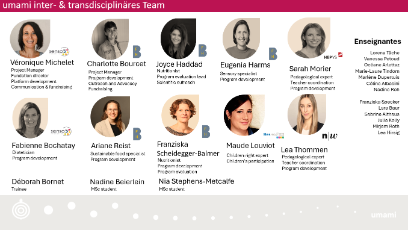
Subprojects
Healthy and sustainable nutrition skills for Swiss primary school students
Researchers from BFH-HAFL and BFH School of Health Professions, who specialise in the food system, met in an interdisciplinary workshop to define the key concepts to be covered by the umami programme. The aim is to ensure that children acquire the necessary skills and knowledge to become responsible and health-conscious eaters. The BFH project team then formulated the skills students need to acquire for each of these concepts.
Turning skills into general and specific learning objectives, organised into a school curriculum
In close collaboration with the Senso5 Foundation, Sarah Morier, an education specialist at the Valais University of Teacher Education, has translated the competencies formulated by BFH researchers into general and specific learning objectives to be achieved in the classroom for each topic. Particular attention was paid to the complexity of the tasks and the classification for each of the 32 teaching modules.
Development of teaching modules to achieve the general and specific objectives
Seven French-speaking teachers and six German-speaking teachers are working with BFH researchers to develop the 32 teaching modules. Sarah Morier (education specialist at the Teacher Training College of Valais (HEP Valais)) and Lea Thommen (education specialist at the University of Applied Sciences Northwestern Switzerland (Fachhochschule Nordwestschweiz)) assist the teachers during the modules’ development. They also ensure the relevance and integration of the modules into the Romandy Curriculum and Lehrplan 21.
Development of the umami platform, which provides free access to the entire programme
A platform containing all the umami programme teaching modules and supporting materials for teachers (glossaries, bibliographies etc.) is currently being developed. The project team has the clear goal of making the teaching materials available to all Swiss teachers free of charge. Therefore, the umami platform will be made available on the éducation21 online reference page.
Development of family activities to expand the curriculum
Families should also improve their nutritional knowledge. In this context, it’s important to strengthen the connection between the school and the family on the topic of nutrition. With the support of BFH researchers, the Senso5 Foundation develops simple and playful activities (e.g. meal recipes) that families can do at home. This ensures that the children’s knowledge and skills are integrated within their households.
Evaluation des umami-Programms
Under the leadership of Joyce Haddad from BFH School of Health Professions, we are conducting two evaluations of the umami programme:
Formative evaluation
This began in January 2025. The aim is to gather information on the implementation and impact of the education programme in order to improve it in a targeted manner. The main objectives of this evaluation are:
- Identify the strengths and weaknesses of the programme in order to make changes and optimise its effectiveness.
- Involvement of stakeholders (teachers, pupils, parents and multipliers) in order to implement targeted improvements.
Nine classes in Cycles 1 and 2 in four cantons (GE, BE, VS, FR) are currently testing the educational modules developed for the “Culinary Practices” and “Food Preferences and Culture” topics.
Two participatory World Café events took place in Bern on 13 March and Lausanne on 25 March to gather feedback from those involved in the programme (school inspectors, specialists from teacher-training universities, staff from cantonal and national health and education services, etc.).
Summative evaluation
This is planned for the start of the 2026 school year and will run for two years. The aim is to measure the overall results and effectiveness of the umami programme in terms of children’s and families’ knowledge, skills, attitudes and behavioural intentions on the topic of healthy and sustainable eating.
Cantons or schools wishing to participate in the summative evaluation of the umami programme should contact Joyce Haddad.
Our long-term goal is to conduct intervention research to evaluate the impact of the programme on the nutritional behaviour of children and families.
Contribution to the Sustainable Development Goals (SGDs)
Nutrition plays an important role in achieving the climate targets and the Sustainable Development Goals (SDGs), which must be met by 2030. With our research project, we are helping to make food systems more sustainable.

This project contributes to the following SDGs
Project manager
Funding organizations



